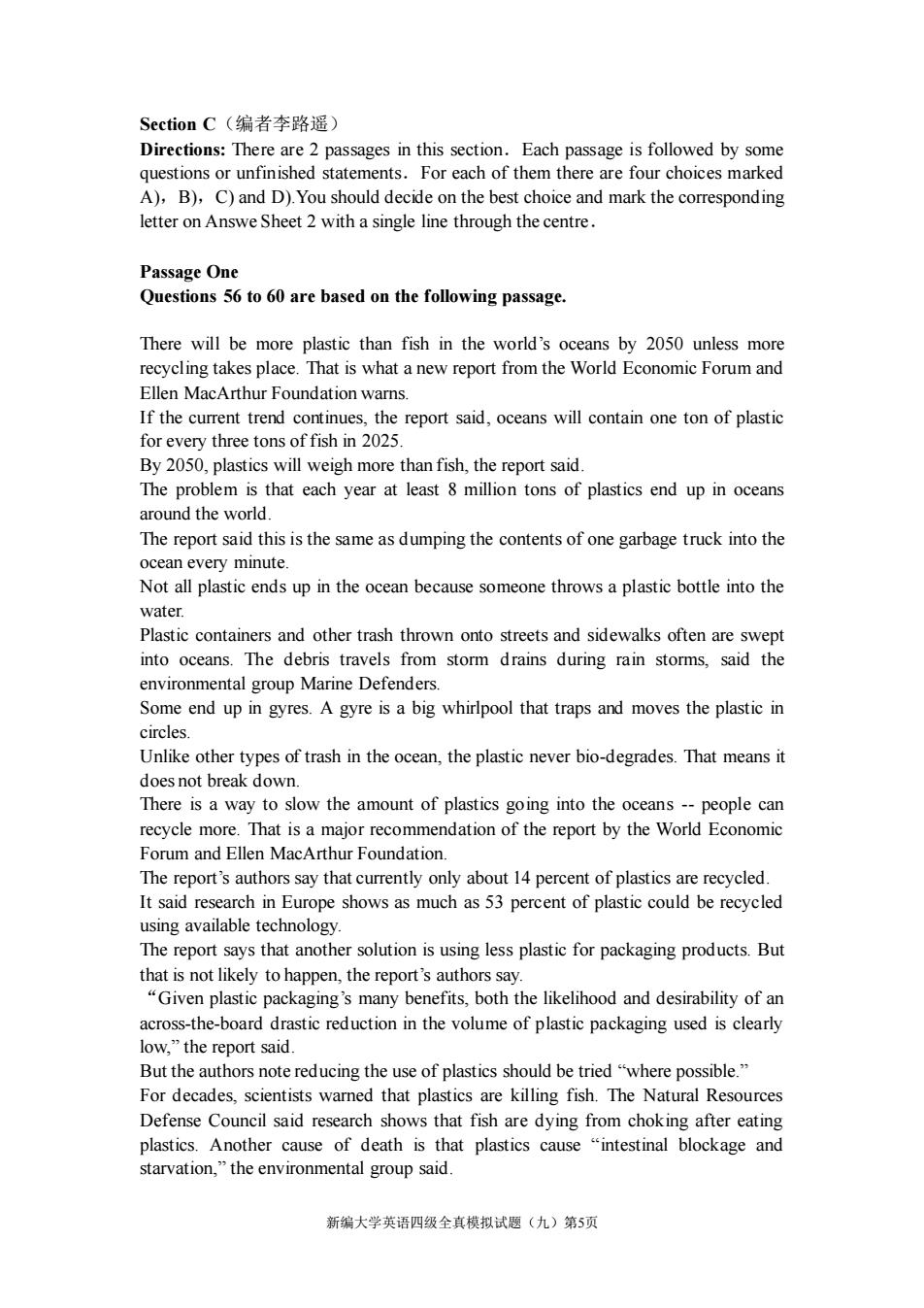正在加载图片...

Section C(编者李路遥) sage sin this section.Each passage of the D)Yo shou decie on the best cicen For eac n there are four letter on Answe Sheet 2 with a single line through the centre. Passage One Questions 56 to 60 are based on the following passage. There will be more plastic than fish in the world's oceans by 2050 unless more recycling takes place.That is what a new report from the World Economic Forum and Ellen MacArthur Foundation wams. If the current trend con ues,t ontai one ton of plastic for every three e report said,oceans will By 2050,plastics will weigh more than fish,the report said The problem is that each year at least 8 million tons of plastics end up in oceans around the world The report said this is the same as dumping the contents of one garbage truck into the ocean every minute Not all plastic ends up in the ocean because someone throws a plastic bottle into the water Plastic containers and other trash thrown onto streets and sidewalks often are swept into oceans.The debris tra els from storm drains during rain storms,said the environmental group Marine Defende Some end up in gyres.A gyre is a big whirlpool that traps and moves the plastic in circles Unlike other types of trash in the ocean,the plastic never bio-degrades.That means it does not break down. There way to slow the amount of plastics going into the ocean people can recycle more.That is a major recommendation of the report by the World Economic Forum and Ellen MacArthur Foundation The report's authors say that currently only about 14 percent of plastics are recycled. It said research in Europe shows as much as 53 percent of plastic could be recycled using available technolo The report s ays that another solution is using less plastic for packaging products.But that is not likely to happen,the report's authors say. "Given plastic packaging's many benefits,both the likelihood and desirability of an across-the-board drastic reduction in the volume of plastic packaging used is clearly low,”the report said. But the authors note reducing the f plastics should be tried"where possible. For decades,scientists wared that plastics are killing fish.The Natural Resources Defense Council said research shows that fish are dying from choking after eating plastics.Another cause of death is that plastics cause "intestinal blockage and starvation,"the environmental group said. 新烂大学英语四级全直模式要(九.)第5页 新编大学英语四级全真模拟试题(九)第5页 Section C(编者李路遥) Directions: There are 2 passages in this section.Each passage is followed by some questions or unfinished statements.For each of them there are four choices marked A),B),C) and D).You should decide on the best choice and mark the corresponding letter on Answe Sheet 2 with a single line through the centre. Passage One Questions 56 to 60 are based on the following passage. There will be more plastic than fish in the world’s oceans by 2050 unless more recycling takes place. That is what a new report from the World Economic Forum and Ellen MacArthur Foundation warns. If the current trend continues, the report said, oceans will contain one ton of plastic for every three tons of fish in 2025. By 2050, plastics will weigh more than fish, the report said. The problem is that each year at least 8 million tons of plastics end up in oceans around the world. The report said this is the same as dumping the contents of one garbage truck into the ocean every minute. Not all plastic ends up in the ocean because someone throws a plastic bottle into the water. Plastic containers and other trash thrown onto streets and sidewalks often are swept into oceans. The debris travels from storm drains during rain storms, said the environmental group Marine Defenders. Some end up in gyres. A gyre is a big whirlpool that traps and moves the plastic in circles. Unlike other types of trash in the ocean, the plastic never bio-degrades. That means it does not break down. There is a way to slow the amount of plastics going into the oceans -- people can recycle more. That is a major recommendation of the report by the World Economic Forum and Ellen MacArthur Foundation. The report’s authors say that currently only about 14 percent of plastics are recycled. It said research in Europe shows as much as 53 percent of plastic could be recycled using available technology. The report says that another solution is using less plastic for packaging products. But that is not likely to happen, the report’s authors say. “Given plastic packaging’s many benefits, both the likelihood and desirability of an across-the-board drastic reduction in the volume of plastic packaging used is clearly low,” the report said. But the authors note reducing the use of plastics should be tried “where possible.” For decades, scientists warned that plastics are killing fish. The Natural Resources Defense Council said research shows that fish are dying from choking after eating plastics. Another cause of death is that plastics cause “intestinal blockage and starvation,” the environmental group said